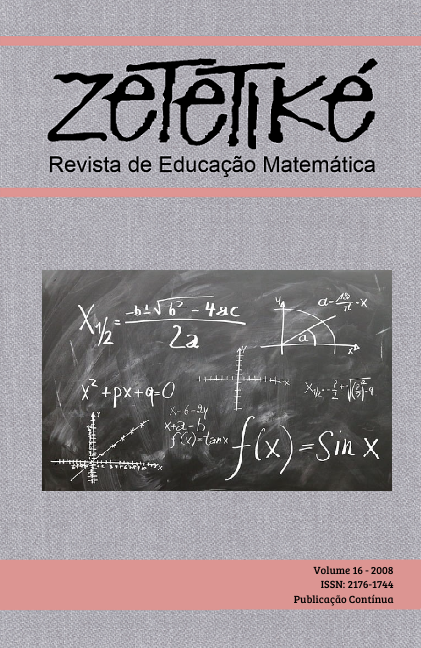Abstract
In this article, we present examples of how spatial Euclidean geometry
activities can be proposed, developed, and discussed at a distance in a virtual
learning environment using a dynamic geometry software. Using a qualitative research approach, we collected data in a university extension distance course
offered to mathematics teachers. In this study, we emphasize the way different
interfaces, such as chat, shape the elaboration of the geometry activities that
were developed in this environment. We end by presenting perspectives on
mathematical production drawing on our experience with the development of a
new virtual learning environment and a geometry software for the Web, both
associated with a project in which our research group is participating. We also
discuss, based on an “empirical” study, how the model for a course, as well as
the media used, condition mathematical production, and how new interfaces can
transform it.
References
BAIRRAL, M. A. Compartilhando e construindo conhecimento matemático: análise do discurso nos chats. Boletim de Educação Matemática, Rio Claro, ano 17, n. 22, p. 37-62, 2004.
BELLO, W. R. Possibilidades de construção do conhecimento em um ambiente telemático: análise de uma experiência de Matemática em EaD. 2004. Dissertação (Mestrado em Educação Matemática) — Pontifícia Universidade Católica, São Paulo, 2004.
BORBA, M. C. As dimensões da Educação Matemática a Distância. In.: BICUDO, M. A. V.; BORBA, M. C. (Org.). Educação Matemática: pesquisa em movimento. São Paulo: Cortez, 2004.
BORBA, M. C. The transformation of Mathematics in on-line courses. In.: CONFERENCE OF THE INTERNATIONAL GROUP FOR THE PSYCHOLOGY OF MATHEMATICS EDUCATION, 29, 2005, Melbourne, Proceedings…Melbourne: PME, 2005. v. 2, p. 177-184.
BORBA, M. C.; MALHEIROS, A. P. S.; FIGUEIREDO, O.; MALTEMPI, M. V. Virtual center for modeling. In.: WORKSHOP TIDIA, 3, 2006, São Paulo, Anais... São Paulo: TIDIA, 2006, p. 146-148.
BORBA, M. C.; MALHEIROS, A. P. S.; ZULATTO, R. B. A. Educação a Distância on-line. Belo Horizonte: Autêntica, 2007.
BORBA, M. C.; MALTEMPI, M. V.; MALHEIROS, A. P. S. Internet avançada e Educação Matemática: novos desafios para o ensino e aprendizagem on-line. RENOTE - Revista Novas Tecnologias na Educação. Porto Alegre, v. 3, n. 1, maio, 2005. Disponível em: http://www.cinted.ufrgs.br/renote/maio2005/index.html. Acesso em: 03 de abril de 2006.
BORBA, M. C.; VILLARREAL, M. E. Humans-with-media and the reorganization of mathematical thinking: information and communication technologies, modeling, experimentation and visualization. v. 39, New York: Springer, 2005.
BORBA, M. C.; ZULATTO, R. B. A. Different media, different types of collective work in on-line continuing teacher education: would you pass the pen, please? In.: CONFERENCE OF THE INTERNATIONAL GROUP FOR THE PSYCHOLOGY OF MATHEMATICS EDUCATION, 30, 2006, Prague, Proceedings… Prague: PME, 2006. v2, p. 201-208.
CARVALHO, P. C. P. Introdução à Geometria Espacial. 4. ed. Rio de Janeiro: IMPA ISOLGRAF,1999. (Coleção do Professor de Matemática).
DELCIN, R. C. A. A Metamorfose da sala de aula para o ciberespaço. In.: ASSMANN, H. (Org.). Redes digitais e metamorfose do aprender. Petrópolis: Vozes, 2005. p. 56-83.
GONZALEZ, M. Fundamentos da tutoria em Educação a Distância. São Paulo: Avercamp, 2005.
GRACIAS, T. A. S. A natureza da reorganização do pensamento em um curso a distância sobre "Tendências em Educação Matemática". Tese (Doutorado em Educação Matemática) – Instituto de Geociências e Ciências Exatas, Universidade Estadual Paulista, Rio Claro, 2003.
JOHNSON, S. Cultura da interface: como o computador transforma nossa maneira de criar e comunicar. Rio de Janeiro: Jorge Zahar, 2001.
KENSKI, V. M. Tecnologias e ensino presencial e a distância. Campinas: Papirus, 2003.
KUDO, T. et al. Using UML Components for the specification of the whiteboard tool. Disponível em: http://www.tidia.fapesp.br/portal/eventos/folder.2006-06- 21.4513988865/15257.pdf.
LABORDE, C. Dynamic Geometry environments as a source of rich learning contexts for the complex activity of proving. Educational Studies Mathematics, Dordrecht, v. 44, n. 1/2, p. 151-161, 2000.
LÉVY, P. As tecnologias da inteligência: o futuro do pensamento na era da informática. Rio de Janeiro: Editora 34, 1993.
LOPES, A. Avaliação em Educação Matemática a Distância: uma experiência de geometria no ensino médio. 2004. Dissertação (Mestrado em Educação Matemática) — Pontifícia Universidade Católica, São Paulo, 2004.
MALHEIROS, A. P. S. Contextualizando o design emergente numa pesquisa sobre Modelagem Matemática e Educação a Distância. In: ENCONTRO BRASILEIRO DE ESTUDANTES DE PÓS-GRADUAÇÃO EM EDUCAÇÃO MATEMÁTICA, 10, 2006, Belo Horizonte. Anais... Belo Horizonte: UFMG, 2006.
MISKULIN, R. G. S. et al.. Identificação e análise das dimensões que permeiam a utilização das TIC nas aulas de Matemática no contexto da formação de professores. Boletim de Educação Matemática, Rio Claro, ano 19, n. 26, p. 103-123, 2006.
OLIVEIRA, E. G. Educação a Distância na transição paradigmática. Campinas: Papirus, 2003.
PONTE, J. P.; BROCARDO, J.; OLIVEIRA, H. Investigações matemáticas na sala de aula. Belo Horizonte: Autêntica, 2003.
SANTOS, S. C. A produção matemática em um ambiente virtual de aprendizagem: o caso da geometria euclidiana espacial. Dissertação (Mestrado em Educação Matemática) – Instituto de Geociências e Ciências Exatas, Universidade Estadual Paulista, Rio Claro, 2006.
SOCOLOWSKI, R. C. A. J. Análise das interações tutor/participante: um ponto de partida para avaliação de cursos de desenvolvimento profissional a distância. 2004. Dissertação (Mestrado em Educação Matemática) — Pontifícia Universidade Católica de São Paulo, São Paulo, 2004.
TIKROMIROV, O. K. The psychological consequences of computerization. In.: WERTSCH, J. V. (Ed.). The concept of activity in Soviet psychology. New York: M. E. Sharpe. Inc, 1981. p. 256-278.

This work is licensed under a Creative Commons Attribution-NonCommercial-NoDerivatives 4.0 International License.
Copyright (c) 2014 Zetetiké: Revista de Educação Matemática

